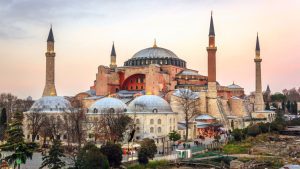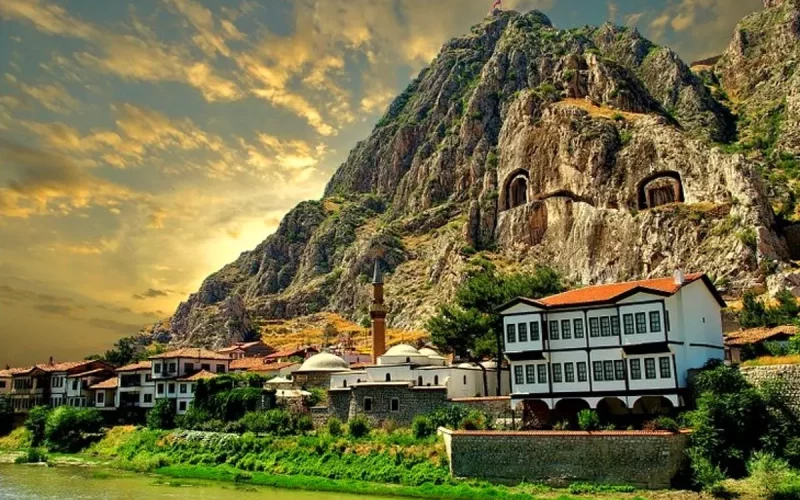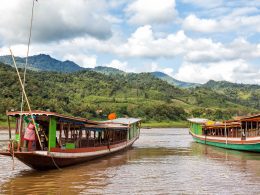Turkey, a mesmerizing blend of the East and West, has long been a favorite travel destination. From its historical landmarks and cultural depth to its modern attractions and breathtaking landscapes, Turkey offers an unmatched travel experience. Whether you are a history buff, an adventure seeker, or a food enthusiast, Turkey has something unique to offer.
Location and Regions
Turkey is strategically located at the crossroads of Europe and Asia, bordered by eight countries and surrounded by three different seas: the Aegean Sea to the west, the Black Sea to the north, and the Mediterranean Sea to the south. The country is divided into seven geographical regions: the Aegean, Black Sea, Central Anatolia, Eastern Anatolia, Marmara, Mediterranean, and Southeastern Anatolia regions, each offering its unique landscape and cultural experiences.
Climate Variations
Turkey’s climate varies significantly across its regions. The coastal areas enjoy a Mediterranean climate with hot, dry summers and mild, wet winters. In contrast, the inland areas experience a more continental climate with hot summers and cold, snowy winters. This variation allows for a diverse range of activities, from skiing in the winter to beach holidays in the summer.

Best Times to Visit
The best times to visit Turkey are during the spring (April to June) and autumn (September to November) when the weather is pleasant, and the tourist crowds are smaller. These periods are ideal for exploring historical sites, enjoying outdoor activities, and experiencing local festivals.
Cultural Insights
Turkish culture is rich in customs and traditions, influenced by its long history and diverse heritage. Hospitality is a cornerstone of Turkish society, and visitors are often welcomed with open arms. Traditional music, dance, and arts play a significant role in daily life, and festivals are celebrated with great enthusiasm.
Language and Communication
The official language is Turkish, and while English is widely spoken in tourist areas, learning a few basic Turkish phrases can enhance your travel experience. Politeness and respect are highly valued in Turkish communication.
Religious Practices and Festivals
Turkey is predominantly Muslim, with numerous mosques and religious practices integrated into daily life. Important festivals include Ramadan and Eid al-Fitr, which are celebrated with communal prayers, feasts, and cultural events.
Turkish Cuisine and Dining Etiquette
Turkish cuisine is a delectable fusion of Central Asian, Middle Eastern, Mediterranean, and Balkan flavors. Meals are a social affair, often shared with family and friends. Common dishes include kebabs, mezes, and baklava. Dining etiquette involves showing respect for the host and enjoying the communal dining experience.
Must-Visit Attractions
Istanbul, Turkey’s largest city, is a captivating blend of old and new. Key attractions include the Hagia Sophia, Topkapi Palace, Blue Mosque, and the bustling Grand Bazaar. The city’s unique position straddling Europe and Asia makes it a vibrant cultural and historical hub.
Cappadocia: Land of Fairy Chimneys
Cappadocia is renowned for its surreal landscapes, featuring unique rock formations known as fairy chimneys. Visitors can explore ancient cave dwellings, enjoy hot air balloon rides at sunrise, and visit the Goree Open-Air Museum.
Thermal Baths in Pamuk kale
Pamuk kale’s thermal baths are famous for their therapeutic properties. Visitors can bathe in the warm, mineral-rich waters while enjoying the scenic beauty of the white travertine terraces.
Beach Activities on the Turquoise Coast
The Turquoise Coast, also known as the Turkish Riviera, boasts pristine beaches and crystal-clear waters. Popular activities include swimming, snorkeling, and exploring secluded coves by boat.
Travel Tips
Recommended Accommodations
Turkey offers a wide range of accommodations to suit different budgets and preferences. Luxury hotels, boutique guesthouses, and budget hostels are available in major cities and tourist destinations. Staying in a cave hotel in Cappadocia or a traditional Ottoman-style hotel in Istanbul can enhance the travel experience.
Transportation Options Within Turkey
Turkey has a well-developed transportation network. Domestic flights are convenient for long-distance travel, while buses and trains are affordable options for exploring different regions. Car rentals are also available for those who prefer self-driving tours.

Packing Essentials
When packing for Turkey, consider the climate and planned activities. Comfortable walking shoes, lightweight clothing for summer, and layers for cooler weather are essential. A modest dress code is recommended for visiting mosques and rural areas.
Safety and Health Precautions
Travelers should stay updated on travel advisories and follow safety recommendations. It’s advisable to have travel insurance that covers health and medical emergencies. Carrying a basic first-aid kit and any necessary medications is also recommended.
Emergency Contact Information
Familiarize yourself with local emergency numbers, such as 112 for medical emergencies and 155 for police assistance. It’s also useful to know the contact details of your country’s embassy or consulate in Turkey.
Budget Planning
Turkey is generally an affordable destination, with options for budget, mid-range, and luxury travelers. Budget travelers can expect to spend around $30-50 per day, while mid-range travelers might spend $50-100 per day. Luxury travelers can enjoy high-end experiences for $150 and above per day.
Money-Saving Tips
Travel Off-Season: Visit during the shoulder seasons (spring and autumn) to avoid peak tourist prices.
Use Public Transport: Buses and trains are cheaper than taxis and private transfers.
Eat Local: Enjoy affordable and delicious meals at local eateries and street food stalls.
Suggested Itineraries for Various Budgets
Budget Itinerary: 7 days in Istanbul, Ephesus, and Pamuk kale.
Mid-Range Itinerary: 10 days covering Istanbul, Cappadocia, Pamuk kale, and Antalya.
Luxury Itinerary: 14 days exploring Istanbul, Cappadocia, the Turquoise Coast, and Bodrum with premium accommodations and private tours.
Conclusion:
Turkey, with its rich history, vibrant culture, and stunning landscapes, is a destination that captivates and inspires. From the bustling streets of Istanbul to the serene beauty of Cappadocia, the ancient ruins of Ephesus to the relaxing shores of Antalya, Turkey offers a diverse array of experiences for every traveler. Whether you’re exploring ancient cities, indulging in delicious cuisine, or enjoying unique activities like hot air ballooning and sailing, Turkey promises an unforgettable journey. As you plan your trip, consider the various regions and climates to choose the best time for your visit. Embrace the local customs and traditions to fully appreciate the Turkish hospitality and way of life. Be prepared with practical travel tips and safety precautions to ensure a smooth and enjoyable experience.












